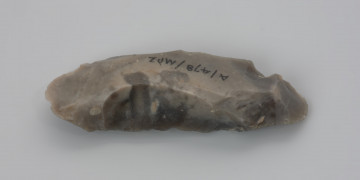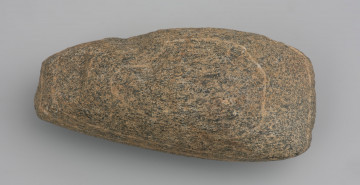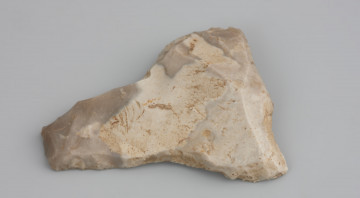
Flake axe
9600 p.n.e. — 5400 p.n.e.
National Museum in Szczecin
Part of the collection: Stone Age
The flake axe was discovered together with other Stone Age artefacts during excavations on an early medieval hillfort in Łobez, the Łobez district. It was made of chalk flint, probably local. Initially, it was light grey, but after being deposited in sediments with a high content of iron compounds, it became covered with an orange patina. The semi-raw material for producing the axe was the large and massive chipping, either waste from the production of another tool or intentionally deflected from the core. The primary technique used to shape the tool was direct striking with a soft pestle. Based on experimental studies, it seems possible that an organic pestle, such as from deer antler, was used. The attention is drawn to the precise execution of the blade, formed with only three break-offs. The pestle edge is both very sharp and resistant to damage, while the way the entire operation was planned and executed suggests a very high level of the maker’s knowledge and skills. Mesolithic axes were tools used mainly for working wood and antlers. They were working parts of the so-called composite tools, composed of elements made of different raw materials. Depending on the needs, it was possible to change the working part or holder and compose tools adapted to the performed work. Multifunctionality was also crucial for nomadic hunter-gatherers because it saved on hard-to-reach raw materials (e.g., high-quality flint) and on the number and weight of tools to be carried.
Michał Adamczyk
Author / creator
Dimensions
cały obiekt: height: 5.5 cm, width: 3.6 cm
Object type
axe (mesolithic tool)
Technique
carving, soft masher carving, hard masher carving
Material
flint, stone
Origin / acquisition method
acquisition
Creation time / dating
Creation / finding place
Owner
National Museum in Szczecin
Identification number
Location / status

9600 p.n.e. — 5400 p.n.e.
National Museum in Szczecin

5400 p.n.e. — 4100 p.n.e.
National Museum in Szczecin

9600 p.n.e. — 9000 p.n.e.
National Museum in Szczecin
DISCOVER this TOPIC
Castle Museum in Łańcut
DISCOVER this PATH
Educational path